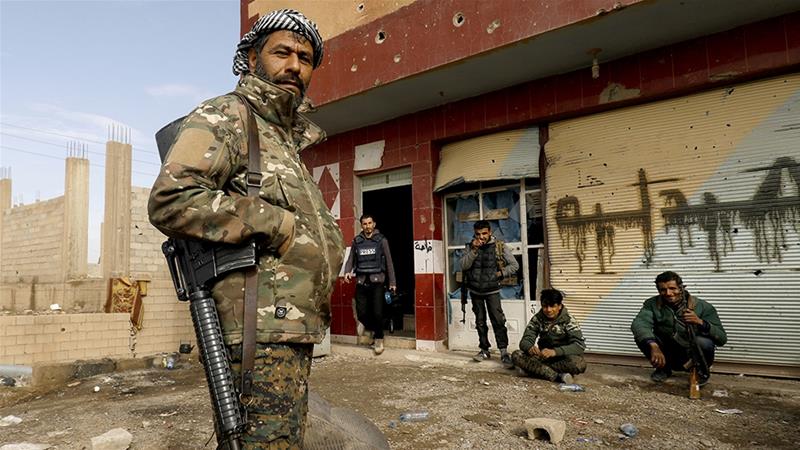
Last week, the US-backed Syrian Democratic Forces launched an offensive in the ISIL-controlled Syrian village of Baghuz [Delil Souleiman/AFP]
US President Donald Trump has demanded that Europe take in hundreds of Islamic State of Iraq and the Levant (ISIL, also known as ISIS) fighters captured in Syria, threatening that the United States would otherwise be forced to release them.
“The United States is asking Britain, France, Germany and other European allies to take back over 800 ISIS fighters that we captured in Syria and put them on trial,” the president wrote in a flurry of social media posts on Saturday.
“The caliphate is ready to fall. The alternative is not a good one in that we will be forced to release them.
|
|
|
US-backed Kurds launch final push against ISIL in Syria
|
“The US does not want to watch as these ISIS fighters permeate Europe, which is where they are expected to go.
“We do so much, and spend so much – Time for others to step up and do the job that they are so capable of doing. We are pulling back after 100 per cent Caliphate victory!” he wrote.
Al Jazeera’s Imran Khan, reporting from Gaziantep near the Turkish border with Syria, said that the latest statement from Trump puts pressure on US allies in Europe.
However, he said that it remains to be seen whether or not ISIL is completely defeated.
Trump caused widespread concern among US allies in December when he suddenly announced that the US would withdraw its troops from Syria and that Islamic State had already been defeated.
Critics warned that the armed group remained a threat and that a pullout could lead to a resurgence, with US allies in the region not equipped to handle the threat alone.
Sami Nader, director of the Levant institute for Strategic Affairs in Beirut, told Al Jazeera that Trump’s remarks are a “recurring theme”.
“The big question is, where will they put these fighters,” Nader said.
“If they put them in French prisons – then it will be known that these prisons have become organizing cells for those to gather and organize themselves,” he said.
“The larger European public does not want these fighters to come back … because they are responsible for terrorist acts.”
The Syrian Democratic Forces (SDF), a US-backed Kurdish-led militia, launched an offensive last week to dislodge ISIL from the village of Baghuz, the only area still under its control, near the Iraqi border.
As the SDF advanced under heavy US air attacks in recent days, a stream of civilians have also fled the few areas that remain under ISIL control, along with defeated fighters trying to escape unnoticed.
Sleeper cells
Though ISIL fighters still hold out in a pocket of central Syria’s remote desert and are believed to have gone underground as sleeper cells in Iraqi cities, their territorial rule is, for now, almost over.
READ MORE
It ends a project launched from a mosque in Mosul in northern Iraq in 2014, when Abu Bakr al-Baghdadi seized advantage of regional chaos to proclaim himself caliph, suzerain overall Muslim people and land.
He set up a governing system with courts, a currency and flag that at its height stretched from northwest Syria almost to Baghdad, encompassing some two million people.
According to Nader, the root causes that led to the emergance of ISIL still remain.
“All the political grievances, the ethnic grievances [are still there] and poverty is widespread in this region,” he said.
Meanwhile, Turkey, which regards the SDF’s strongest component, the Kurdish YPG, as terrorists, has threatened to march deeper into northern Syria to drive it back.
On Friday US Army General Joseph Votel, who oversees American forces in the Middle East as head of Central Command, said the end of ISIL could lead to a more dispersed, harder-to-detect network of fighters waging guerrilla warfare.
That should require continued help from Washington, he said.
